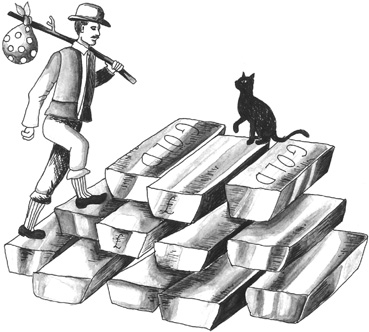
TURN again, Whittington, thou worthy citizen,
Turn again, Whittington, Lord Mayor of London.
Make your fortune, find a good wife,
You will know happiness all through your life.
Turn again, Whittington, thou worthy citizen,
Turn again, Whittington, thrice Mayor of London.
Thanks to this rhyme – sung as a round (see London’s Burning) – and his representation in pantomime in the manner of a fairy-tale character such as Cinderella or Aladdin, one might be forgiven for thinking that Dick Whittington is fictional, but he was a real person.
Born in the village of Pauntley in Gloucestershire around 1354, Richard Whittington went to London as a boy, after supposedly being told the streets there were ‘paved with gold’, to learn the trade of a mercer (trader in textiles). He worked hard and soon became successful, importing exotic new material such as velvet and silk and exporting English wool in return (see Baa, Baa, Black Sheep). By 1397, he was making such a fortune that he started lending vast sums of money to the king, Richard II. In return, the king granted him the prestigious position of Lord Mayor of London. Richard Whittington worked just as hard at making a success of his new role and proved to be so popular that he retained the honour for an unheard-of second year.
But when King Richard was deposed, in 1399, Whittington feared for his future and decided to return to

Gloucestershire and a comfortable retirement. It was on his journey out of London, legend has it, that at High-gate Hill he heard the peal of Bow Bell (see Oranges and Lemons), calling him back to the city: Turn again, Whittington. The popular merchant duly returned and prospered even further under Richard’s successors, Henry IV and Henry V, supplying the court with valuable textiles and cloth. In 1406, Whittington became Lord Mayor of London for the third time (thrice Mayor of London) and again, for a final term in office in 1419, although the rhyme doesn’t allude to that.
He never forgot his humble origins, however, and was fondly known by Londoners as Dick, rather than Richard, Whittington. During his lifetime, he donated most of his profits to the City of London, financing many improvements for the benefit of the common people, such as public drinking fountains, a ward at St Thomas’s Hospital for unmarried mothers, and accommodation for the homeless. He also rebuilt the Guildhall, paid for basic drainage systems and sanitation in slum areas and built Greyfriars Library to help improve education in that area.
When he died, in 1423, he left £7,000 to the Company of Mercers (equivalent to around £5 million in modern terms), which funded construction of the Guildhall Library, repairs to St Bartholomew’s Hospital and the building of further almshouses for the homeless. In death, Dick Whittington became something of a folk hero and his legend is sure to live on. The only unfortunate part is there appears to be no mention anywhere in records of his life of his faithful cat, made famous by its appearance in story and pantomime. Although the image of a cat is supposed to have been carved above the gates of Newgate Prison after his death and, some say, also painted on a carriage presented in Whittington’s name in 1572 to the Guild of Merchants, there is no real evidence to substantiate either of these claims.
It is through the legend of Dick Whittington that the expression ‘The streets are paved with gold’ has passed into common usage to describe a town or city full of opportunity and well worth a visit for the aspiring young entrepreneur. The first record of any London play about the former Lord Mayor dates from around 1605 with a production entitled The History of Richard Whittington, of his lowe byrth and his great fortune. Later in the century, Samuel Pepys wrote in his diary in 1668: ‘Then to Southwark fair, very dirty, but saw the puppet show of Whittington, which was pretty to see.’ In 1814, Dick Whittington made his debut as a pantomime character, with one of the greatest clowns of all time, Joseph Grimaldi (1778-1837), playing the role of Dame Cecily Suet. Chiefly thanks to pantomime, London’s most famous Lord Mayor still lives on today.